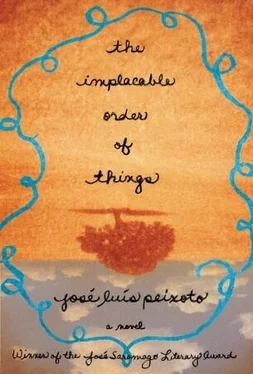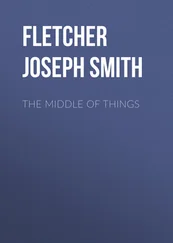The apprentice spent the whole morning cleaning up. He gathered wood scraps from the floor and threw them on a pile in the yard, and with a wooden scoop he transferred little mounds of sawdust and shavings onto a large cloth, whose four corners he then joined in his right hand, carrying the cloth on his back to the largest pile in the yard: a small sawdust mountain. Nearly every day someone would show up with an empty sack, wanting to fill it with shavings to make a bed for rabbits in a rabbit hutch. Every week the baker would come by with his pushcart to take away wood scraps and boards that were of no use for carpentry work but were excellent for burning in his bread oven. But no one could make use of the whole pile of scraps or the whole pile of sawdust, so busy was the shop, and the piles were rising into the sky. Master Rafael and Salomão were in the yard. The apprentice went back and forth behind them, briskly when carrying a load, slowly after dumping it. The sun was hot, as if it were afternoon, and a glowing mist rose up from the ground covered with pinewood chips, a mist like the sound of burning, like water, like half-transparent, half-frosted glass. Master Rafael held his end of the saw, and he had more power in that one hand than most men have in two. On the other side of the log that they were cutting, Salomão, with sweat running down his face, signaled that he needed some water. He tilted the earthen jug until the bowl was filled, and drank voraciously while Master Rafael slowly walked over. Then he bent down again, refilled the bowl, and handed it to Master Rafael, who took it and said I want to tell you something. And he lifted the bowl to his lips, covering his whole face up to his blind eye and the eye that looked straight at Salomão. The gazes of both men were linked for a moment. Taking the bowl from his mouth, he shook out the remaining drops of water, slung it over the neck of the jug, stood up straight, and said I’m going to marry the blind prostitute. Salomão smiled like a young boy, put his hand on the master’s shoulder, and congratulated him. Master Rafael also smiled.
TONIGHT MY BODY DIDN’T ASK for sleep. I lay down in bed, but my eyes didn’t close. I remained in the light, which filled me up: a light from the sky, from the sun, breaking through the night and the roof and my chest, a light blinding me to everything else. I lay there with my legs extended and with my arms extended but without feeling them. I think: perhaps pain exists to forewarn us of a yet greater suffering. On my back, beneath my clothing, I feel the pain of raw flesh. I think: pain exists to forewarn us of a greater pain. And all day and all night my mother sat, she still sits, next to the fire. As if it were cold, as if she lived in a never-ending winter, she sits very still next to the embers, with the flames lighting up her face and reveries. And sometimes she stirs the embers with the tongs, or quickens them with the fan. Sometimes she moves a pot closer to the fire, or puts a pot on the trivet. Sometimes she gets up and fetches more wood: brushwood, sticks, logs: wood that she brings back all hunched over, very quickly, so as not to be away from the fire for more than a deep breath. And she sits there, withdrawn into a nocturnal mourning, hypnotized, as if her small and frail body were absorbing all the fire, as if she lived in a never-ending winter, as if it were cold. And outside, beyond the house walls, the sun burns, as it burns here in my silence. The sun ruthlessly withers the grass, our skin, our hopes. And yet you know I understand you, mother. Even if I don’t say it. Even if you don’t say it. You know that when I walk past you and you look at me with pleading in your gaze, I feel like caressing you, I feel like holding your hands the way I did when you took me into your arms and were so much my mother, the way I did when I was a little boy. But today, when I walk past you, I’m no longer the boy you called to yourself with open arms. Today, a man and indifferent, I walk past you and pretend not to hear the laments in your gaze. And yet you know I understand you. I understand your freezing cold in the middle of August, your mourning that makes you weak, weak, weak. As I understood you on the night when I was getting ready to go meet her in town, and you looked at me and said without words don’t go. I understood you on that night when she was waiting for me, when the excitement in my blood suddenly halted, and I listened to you, let my hands fall, and entered this solitary bedroom and lay down on this solitary bed where I am right now, alone. Mother, you sit by the fire and shiver with cold, the way burning embers gelidly shiver, and there in the distance where you are the night’s mirror, you know that I’ve never hated you. I’m your son and your reflection. And outside the yard is now golden with the light of the sunset, and she walks across that light. Abandoned, with a scarf on her head and looking down, she has stopped questioning the world. Old Gabriel says to her see you tomorrow. Soon the lingering light will lie down in its black coffin. And here I remain in a seemingly endless midday, wrapped all around by an impenetrable solitude.
WHEN OLD GABRIEL SAID SEE YOU TOMORROW, I was an almost invisible piece of the afternoon touching him. I kept walking, leaving him yet farther behind me. The path cutting through the plains brought me to where I am now. On the road back to town, walking. Already far from the Mount of Olives but still close to the long afternoon I spent at the rich people’s house. And here I cross paths with myself going to the farmstead after lunch. I see myself coming my way. It’s me going to the farmstead. And I’m coming from the farmstead. I’m coming from the farmstead and see myself going to the farmstead. I’m going to the farmstead and remember the face of Salomão eating and smiling for no reason; I remember Salomão asking me for a needle, raising one of his rough hands up to the light and, with the tip of the needle, digging into his finger’s skin to extract a pinewood splinter. That’s what Salomão did during lunch and that’s what I thought about. I pass by myself. I pass by these thoughts. The sun’s scorching heat makes me sweat. I was walking in the hottest hour. When I reach the rich people’s house, I’ll dust and sweep and open the windows of the upstairs bedrooms, and then I’ll sit in the main hallway, in front of the voice shut up inside a trunk. That’s what I did. I pass by myself. I pass by these thoughts. I tidied up the house in half an hour and spent the rest of the afternoon listening to the voice shut up inside a trunk. I heard it say many things, but I paid the most attention when it said: pain exists to forewarn us of a yet greater suffering. I heard the voice shut up inside a trunk say these words, and I see myself vanish down the road, heading toward the Mount of Olives to hear them for the first time. Here, where I’m walking, the sun slowly declines. I keep on. The town awaits me, with its streets and the women whispering as I pass by. My mother awaits me, without knowing it. In the evening I’ll hear her talk to herself, repeating her eternal story. Her oppressively eternal story, not because it never ends but because it never lets up, because there’s no pause to distinguish the end from the beginning. In the evening I’ll do nothing but hear her, like on that night when I didn’t sleep and the next day the doors and windows of José’s house were all shut, as they also were today. It happened in the April when I started working at the rich people’s house. On that late afternoon, balmy like this one, José arrived from the fields when I was leaving. We stopped and looked at each other. He said good afternoon, and his voice was part of that soft light. In the sky above us a stork glided by very slowly, its wings wide open, carrying a dry stick in its very long beak. And that moment was ours and enormous. Looking at me steadily, he said wait for me, tonight I’ll come and fetch you. And on that day I didn’t feel the long walk to town as I feel it today, every single step. I arrived home, brought my mother inside, and gathered some clothes into a bundle. It was already dark, I was folding a shirt, when through the wall I thought I heard the man shut up in a windowless room writing begin to cry. The never-ending stream of his fountain pen paused for longer than usual, and I thought I heard two teardrops fall on the tabletop. Perhaps they’re two drops of ink, I thought. In the kitchen I heated up some water to make bread soup and gave it to my mother. With each spoonful the imagined face of José appeared more distinctly in the real space of the doorway. Looking at what I was thinking, I sometimes missed my mother’s mouth, and I’d see him, I’d hear him say come with me. That night, when I removed the bib from her neck, it was dirtier than usual, spotted with dried broth. I looked intently at my mother and smiled, trying to tell her my joy. I took her to the stool by the stove, straightened her clothes, and combed her hair with my fingers. I sat down. I placed my hands on my legs. And we waited. And we waited. Which made the time drag even more. That night each minute was like a whole night. A breeze that came and went kept making the door shake and I quivered within. And time, its substance, entered slowly, very slowly, through my pores. He’s sure to come, he’s on his way and is sure to come. And time. My mother repeated the words she repeated and repeated, she repeated her gazing and her breathing, her gazing and her breathing, the avid breathing between her words, her gazing, she repeated, she repeated her own self until she was many, all the same, in the same place, in a repeated time. And I looked at my hands, not believing that they were empty, not believing that I could ever imagine them as anything but empty. And the kerosene lamp made us older. The feeble, doomed shadows bowed down and slowly advanced, like smoke, along the floor and the walls. He’s sure to come, he’s on his way and is sure to come. And when it was probably already very late my mother’s breathing became longer, her words occupied her breath. Her chin had fallen against her chest. She slept. I took her to the bedroom and laid her in bed. I took off her slippers, took off her clothes, and covered her with the sheets. I caressed her cheeks. I would have liked him to see her, I would have liked to show him my mother, I would have liked to say to him this is my mother. And her skin, peaceful and distant, so calm under my fingers. I slowly closed the door. I blew out the lamp. I sat down. I rested my hands on my legs. Alone, in the darkness, I waited until the first light of morning.
Читать дальше












